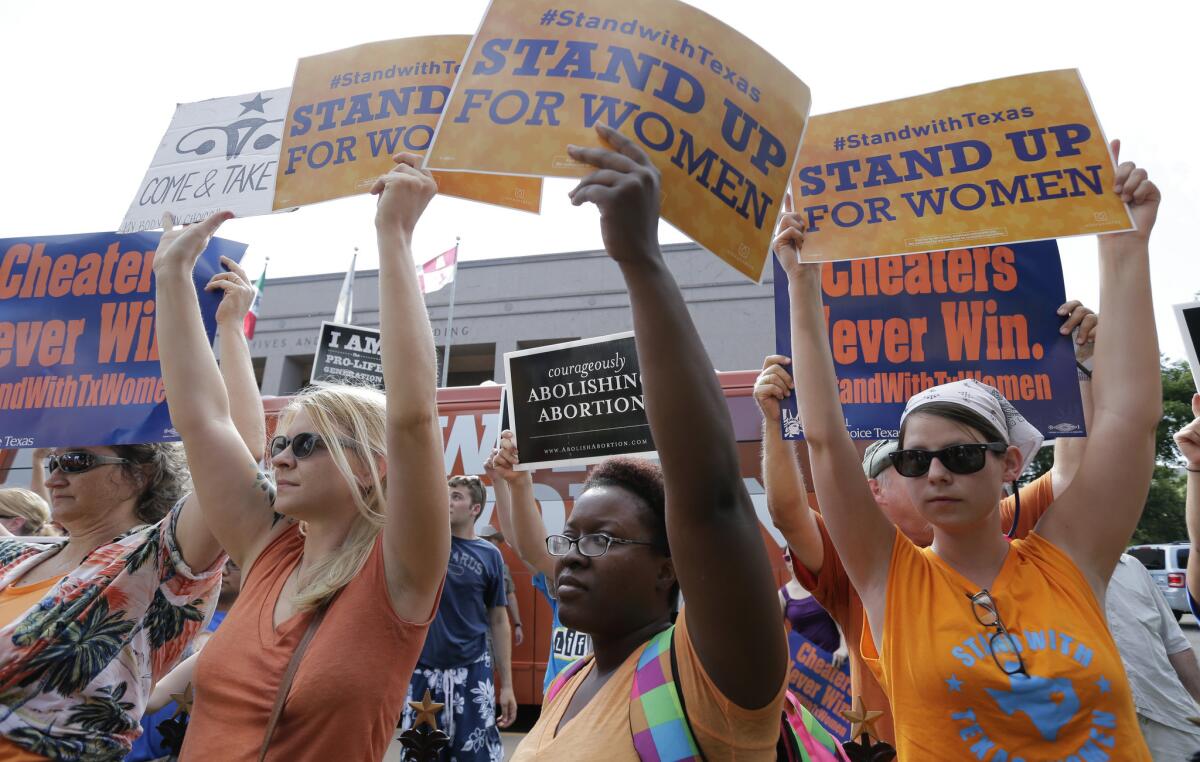Senate Democrats move to prevent state restrictions on abortion

Hoping to appeal to female voters, Senate Democrats pushed a bill Tuesday to prevent states from placing restrictions on abortion that do not apply to other medical procedures.
Democrats say the bill would prevent states from singling out abortions and protect women’s reproductive rights. The Women’s Health Protection Act comes in response to the recent push in some states to impose new limits on the practice. These restrictions include requiring that doctors who perform abortions have admitting privileges at nearby hospitals, curtailing training for abortion services and limiting the remote prescription of drugs to end a pregnancy without a doctor’s visit.
With no Republican support, the bill has little chance of passing the House and critics dismissed the measure as a political tactic aimed at the midterm election.
“This bill is a weak political ploy,” said Sen. Charles E. Grassley (R-Iowa). “It’s unfortunate that the [Senate] majority is using this issue to appear compassionate and concerned about women’s rights when, in reality, the bill disregards popular and common sense laws enacted by various states aimed at protecting women and children across the country.”
Single women, who make up 25% of the electorate, have historically voted for Democrats. Two-thirds of single women voted for President Obama in the last election. However, unmarried women tend to participate less in midterm elections, a concern for Democrats hoping to maintain control of the Senate this fall.
The bill could appeal to female voters concerned about their reproductive rights, particularly in light of the Supreme Court’s recent Hobby Lobby decision. In Burwell vs. Hobby Lobby, the court ruled 5 to 4 that businesses could deny contraceptive coverage on religious grounds. Last week, Democratic lawmakers unveiled legislation that would require all employers to provide contraceptive coverage included in the Affordable Care Act — legislation that is also unlikely to pass the House.
Sen. Richard Blumenthal (D-Conn.) said during a Senate Judiciary Committee hearing that the Women’s Health Protection Act was a response to an “avalanche of measures that purportedly protect women’s healthcare but in reality restrict reproductive rights.”
Since 2011, states have passed more than 200 laws that limit access to abortion, according to Nancy Northup, president of the Center for Reproductive Rights, a Washington-based legal advocacy group. Critics of the state measures say these limitations do not apply to other medical procedures and are not supported by scientific evidence.
Last year, Texas passed a law requiring that physicians performing abortions also have hospital admitting privileges within a 30-mile radius of their clinic. Because many physicians do not have this privilege, more than a third of Texas’ state clinics no longer offer abortions, Northup testified at the hearing.
Mississippi also passed a law requiring local hospital admitting privileges. Willie Parker, a doctor providing abortions in Mississippi, said the law threatened to “shut down the one remaining abortion clinic in the state, effectively denying women access to coverage.” When Parker applied for hospital admitting privileges, he was denied, he said.
Opponents of the Women’s Health Protection Act say the state laws are designed to guarantee safe abortions. Monique Chireau, an assistant professor at Duke University Medical Center, said that hospital admitting privileges implied a “level of competence” and gave doctors the ability to transfer care, should complications arise.
Republican lawmakers said the Democrat-backed bill was overreaching and interfered with state rights.
“I don’t recall Congress ever passing a law that prohibited states from enacting certain categories of laws simply because Congress says so,” said Sen. Orrin G. Hatch (R-Utah). “I can’t imagine why any state legislature would support this no matter their position on abortion.”
marianne.levine@latimes.com
More to Read
Start your day right
Sign up for Essential California for news, features and recommendations from the L.A. Times and beyond in your inbox six days a week.
You may occasionally receive promotional content from the Los Angeles Times.






